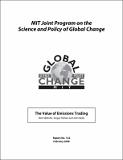The Value of Emissions Trading
Author(s)
Webster, Mort David.; Paltsev, Sergey.; Reilly, John M.
DownloadMITJPSPGC_Rpt132.pdf (574.2Kb)
Metadata
Show full item recordAbstract
This paper estimates the value of international emissions trading, focusing attention on a here-to-fore neglected component: its value as a hedge against uncertainty. Much analysis has been done of the Kyoto Protocol and other potential international greenhouse gas mitigation policies comparing the costs of achieving greenhouse gas emission targets with and without trading. These studies often show large cost reductions for all Parties under trading compared to a no trading case. We investigate the welfare gains of including emissions trading in the presence of uncertainty in economic growth rates, using both a partial equilibrium model based on marginal abatement cost curves and a computable general equilibrium model that allows consideration of the interaction of emissions trading with existing energy taxes and changes in terms of trade. We find that the hedge value of international trading is small relative to its value in reallocating emissions reductions when, as in the Kyoto Protocol, the burden-sharing scheme does not resemble a least-cost allocation. The Kyoto Protocol also allocated excess allowances to Russia, so-called “hot air,” and much of the value often attributed to emissions trading stems from other Parties having access to these extra allowances, which has the effect of lowering the aggregate emissions target. We also find that the effects of preexisting tax distortions and terms of trade dominate the hedge value of trading. We conclude that the primary value of emissions trading in international agreements is as a burden-sharing or wealth transfer mechanism and should be judged accordingly.
Description
Abstract in HTML and technical report in PDF available on the Massachusetts Institute of Technology Joint Program on the Science and Policy of Global Change website (http://mit.edu/globalchange/www/).
Date issued
2006-02Publisher
MIT Joint Program on the Science and Policy of Global Change
Citation
Report no. 132
Series/Report no.
Report no. 132